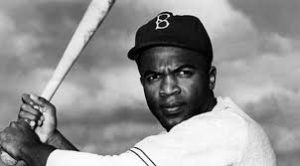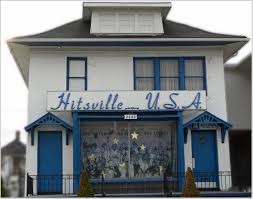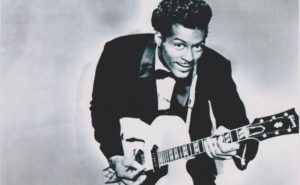Again about Black History Month, as it ends…
It’s hard to find ways to honor Black History Month in classical music, because the classical music mainstream hasn’t related much to African-American life.
A sad tale:
 When Jackie Robinson became the first black player in major league baseball — something now celebrated as a key event in American history — the Met Opera had never had a black soloist on stage. This was in 1947.
When Jackie Robinson became the first black player in major league baseball — something now celebrated as a key event in American history — the Met Opera had never had a black soloist on stage. This was in 1947.
Jackie Robinson played in Brooklyn, across the river from the Met. So don’t think no one thought the Met might baseball’s lead. Someone went to Edward Johnson, who back then ran the opera house, and suggested it was time. No, said Johnson. “Don’t I have enough trouble already?” (I’m paraphrasing. Don’t have the exact quote in front of me. The source for this story is Irving Kolodin’s masterful, thorough, and immensely readable history of the Met, year by year from the founding to 1966.)
The Met didn’t have a black soloist until 1955. That 1947 conversation wasn’t a great moment for classical music.
While in pop music…
1947 came near the start of something unprecedented. What happened was the emergence — first gradual, then explosive — of African-American music into the pop music mainstream. And no, I’m not talking about the influence of African-American music. I’m talking about the music itself, sung and played by black musicians. Or by whites, doing what the black musicians did.
This was explosive. This was the arrival of rock & roll, which hit the pop world bigtime in 1954, the same year as the Supreme Court’s epochal decision banning the state-imposed segregation of the races in schools in the American south. Which of course was a key moment in the march toward racial equality, still in progress.
From that time on, we can map the black struggle — the civil rights movement, and everything else — against the history of American pop music. So much is reflected. Like the emergence of Motown Records early in the 1960s, again a major step toward equal black participation in American life. A stellar black-owned business…songs written, sung, played, produced, and marketed by African-Americans soaring on the pop charts. Never happened before!
 You can read about Motown Records in a stellar (and, again, immensely readable) book by David Maraniss, Once in a Great City: A Detroit Story. About how Detroit’s peak years in the early ‘60s already bred the seeds of its decline. Motown Records is a big part of the story. The Detroit Symphony is barely mentioned, if at all.
You can read about Motown Records in a stellar (and, again, immensely readable) book by David Maraniss, Once in a Great City: A Detroit Story. About how Detroit’s peak years in the early ‘60s already bred the seeds of its decline. Motown Records is a big part of the story. The Detroit Symphony is barely mentioned, if at all.
Returning now to my main thread…
All of this is a longish intro to three songs I assigned in my Juilliard course on the future of classical music. Three songs that show something missing in classical music’s links to our wider culture: Any close connection with African-American life.
This didn’t mean African-Americans didn’t care about classical music. Many did. In fact there was a lively classical music culture in black communities before World War II. But AFrican-Ameridans, the lives they lead, and their history — almost none of that was reflected in anything the classical music world did. Or in the music itself.
Remember my last post, with Aaron Dworkin talking about the performing arts not reflecting the lives of many people in our world? Pop music hasn’t had that problem. There were struggles — black music relegated to a “race music” (ugly term) category, before World War II. And then the pop music industry trying in various ways to suppress or limit or segregate it. But black music fought back. Emerged fully into mainstream view.
And, even when segregated, always was there to reflect black life and history.
The three songs:
 Chuck Berry, “Brown-Eyed Handsome Man” (1956) Sly song about how powerful, how potent black men can be. Because every time Chuck Berry says “brown-eyed” you know he means “brown-skinned.” Way ahead of its time in 1956! Lyrics.
Chuck Berry, “Brown-Eyed Handsome Man” (1956) Sly song about how powerful, how potent black men can be. Because every time Chuck Berry says “brown-eyed” you know he means “brown-skinned.” Way ahead of its time in 1956! Lyrics.
Sam Cooke, “A Change is Gonna Come” (1963). Cooke was a gospel singer who saw an opening for African-Americans in the pop world, when rock & roll came in. Wrote lilting, sweet songs for teenagers. Huge success. Then when the civil rights movement grew wrote and sang this haunting song — surely one of the greatest pop songs ever — about what the future could bring. Lyrics
Grandmaster Flash & the Furious Five, “The Message” (1982). Urban black communities had serious problems. And this song — the first hiphop song with social commentary — told us the news, with a harsher sound and harsher words that the pop mainstream was used to. A shock — necessary, bracing shock — to hear it on pop radio. Lyrics.
Argue all you want about the deep inner strength of classical music. But for cultural power, in today’s world — and for relevance in Black History Month — we can’t match these songs. Can’t even come close.

Classical music is slow for sure! Anthony Davis’s Malcolm X opera was premiered by NY City Opera in 1986. (Give or take 7-10 years, about the same lag from Nixon’s visit to China to Adams’s Nixon in China.) But of course vernacular culture is more nimble . . . how much did it cost to record Gil Scott-Heron’s “The Revolution Will Not Be Televised”? And how many recording artists are out there, compared to the bottleneck number of opera companies? So the solution to the classical music relevance problem is to make it fast, cheap and ubiquitous. I leave it to you and your students to work out the details . . .
On second thought, maybe it is simply a question of volume. Berry Gordy kept politics out of Motown recordings – only a small percentage of the overall catalog would speak to these social issues. And classical music CAN be up to the minute – Berio’s Sinfonia responding to the MLK assassination within months in 1968; Reich’s Come Out in 1966, Rzewski’s Coming Together, about Attica in 1971. So perhaps only a small percentage both genres qualify as “relevant”?
In many ways, Motown didn’t need to be explicitly relevant. The implicit relevance was staggering. Suddenly so many songs at the top of the pop charts (I remember them so vividly from those years) were by black singers, written and recorded at a black-owned record company. Which surely was the most sensationally succesful black-owned business in the US up to that point. An amazing new thing in the world — and I think we hear the newness and excitement of that in the music, and the many new things (James Jamerson’s bass, all the improvised studio tricks, like using wooden boards for hand claps, and recording some things in the bathrooms to get reverb. Such a sense of a triumphant new journey. So evident at the time that we hardly needed words to tell us what was going on.
And what do all those songs have in common? A BEAT! No pulse = dead = classical. Groove-free crap has taken its toll (rock bottom for me, Cage 4’33”). Minimalists at least had a pulse… But glassy runaway arpeggios are hardly a load bearing branch on our evolutionary tree. At the trunk, however, is the tradition of embracing pop rhythms (e.g. Bach).
The gigue, the sarabande, the bouree… Bach elevated these grooves with complex harmony and counterpoint. He worked pop beats into canons, fugues, etc. Even after JSB’s music “died”, its groovy seeds lay dormant on the shelf ready to be re-planted a century later, when metal strings pumped up the volume encouraging soloists to rock out.
The last century was an anomaly, out of phase with the long arc of history. Time to prune its dead branches back so new ones may sprout. The Bach of our generation will obviously be working amplified with hip hop beats. It is the only way to continue the REAL tradition, which is to get louder whenever technology allows, have a pop-inspired groovy pulse, and immortalize it all with the highest craft standards.
And if we are to embrace hip hop’s fresh beats, should we not embrace its attitude as well? Hardcore (not radio) rap does a great job policing the BS with battlers calling out the cons. Proclamations of superiority are a HUGE part of the hip hop tradition (and used to be part of ours). Every hip hop band, including mine, covered “The Message” back in the day, but liberals are too quick to explain hip hop’s harshness as “social commentary”. At its roots, hip hop was a battleground.
So in addition to a pulse… How about an attitude?